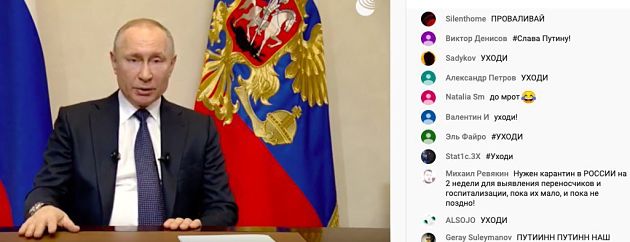After a long public silence and with a delay of one to two weeks compared to his colleagues at the helm of most countries in the world, Vladimir Putin finally addressed the Russian people today in connection with the coronavirus pandemic. Emotionally, his speech did not seem confident and sincere, but let’s put emotions aside and focus on the concrete measures mentioned in it. First of all, the postponement of the vote on Putin’s constitutional amendments, as well as measures to support the population and business.
The first measure is welcome, as is the postponement of the execution of an illegally imposed sentence. It is clear that it does not solve the problem of the illegitimate sentence, in this case the constitutional sentence, but it forces those who achieved and issued it to at least delay the implementation of their plans. That’s not bad.
As far as the measures to support the population are concerned, we have to distinguish between the undoubtedly rational measures that have been announced in many other countries two weeks ago, such as the exemption from taxes and contributions to state insurance funds, the automatic extension of benefits without the need for documents that require going through various instances, and also the rational measures that require resources. Such measures may include increasing the amount and duration of sick leave, or deferring loan repayments and interest thereon, as well as restricting bankruptcy procedures, etc. Obviously, in many cases, the burden of these measures will fall on the private sector – employers, creditors, etc. – who are already in a difficult situation.
In order to prevent this, they should be given proportional support, which requires the creation of some kind of state emergency fund. As some experts write, such measures were proposed by the head of the Coronavirus Response Center, Sergei Sobyanin, and the Minister of Economic Development, Andrei Belousov, but Putin limited himself to half measures such as increasing taxes on interest and dividends from deposits and securities, as well as on funds transferred to offshore accounts.
The same goes for measures to combat the epidemic in general. In contrast to the governments of many European countries, Putin did not introduce a quarantine or a state of emergency, as proposed by Sergei Sobyanin, but limited himself to announcing the following week as non-working. This softened response is based on the one hand on the fact that the epidemiological situation in Russia is better than in Europe and does not require such strict measures, and on the other hand on the consciousness of Russians and their intention to stay at home except for necessary trips.
Time will tell if this calculation is justified… However, it can already be said that Putin’s speech did not convince the market – if before the beginning of his speech the exchange rate was 78.57 rubles per dollar and 85.08 rubles per euro, at the end of his speech the exchange rate was 78.84 rubles per dollar and 85.29 rubles per euro.

